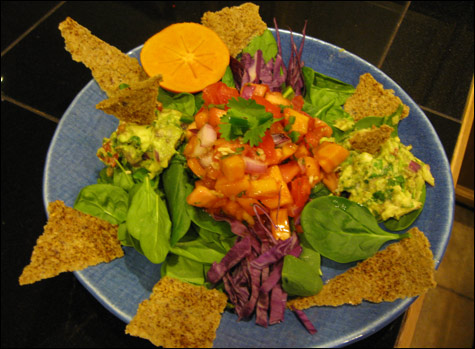
ALL RAW: Dehydrated corn chips, mango salsa, guacamole, and red cabbage over spinach greens, with a garnish of persimmon. Photo by Christy McKinnon. |
What is that smell? I stick my face in my pit and take a puzzled whiff. I want to ask somebody else to smell me. "Hey, stranger — yeah, you over there. Would you mind just sniffing my pit ... I can't quite figure out what that smell is." But I wait it out instead. A few days at least. Until finally it hits me. Indian curry! No wonder I want to eat myself. I smell of curry!
In my mind I am doing a little jig of victory because I have defeated foul-scented BO. Rather than trail around a scent akin to wet dog or dingy subway, I am perfumed with curry. This is what happened to me after a week of eating only raw foods.
A quick-and-dirty definition of an all-raw diet: Nothing is heated above 118 degrees Fahrenheit. Ever. Which means no cooked food (though dehydrated food is OK). This ensures that every vital nutrient and enzyme in the food lives on, since cooking is sure to kill at least a few.
Every year as many as 98 percent of the total atoms in your body are replaced, says Victoria Boutenko, author of Green for Life, a manual on the importance of eating raw (Raw Family Publishing, 2005). Ninety-eight percent of the atoms that make up your cells, tissues, organs, and other parts of the bod, all of it — are rebirthed yearly. Dead cells are released from their respective organs and set afloat on the sea of your bodily fluids until they're, um, ejected. (Flush.) Unless they're not: Material that backs up in our bodies can contribute to our "natural" stench, suggesting that a poor diet could make you stink — on top of contributing to disease and ill health.
Which brings me to fiber. It helps to transport all those dead cells out of your system. The truth is the majority of Americans eating a typical All-American diet of refined sugars, meats, and dairy don't even meet the US Food and Drug Administration's recommendation of 25 grams of fiber per day — a recommendation Boutenko says is woefully inadequate to begin with. And what's even worse is that most of us don't even consume half that.
Boutenko suggests that if we want to keep up with our bodies' elimination processes (and thereby reduce stinkiness), we should consume 50 to 70 grams of fiber per day. But she suggests we do even more.
Chimpanzees, who share 99.4 percent of our DNA, consume upwards of 300 grams of fiber per day. Boutenko claims that because of the similarities between humans and chimps, including our DNA, cognitive capacities, and social structures, our dietary habits should be more aligned with those of the chimpanzee.
Of course, chimps don't do much cooking. Raw greens, fruits, and blossoms make up more than 90 percent of their diet. Boutenko uses the chimp rationale to persuade readers that a raw diet brings optimum elimination and optimum health.
I'm not sure about optimum health, but it certainly has brought me optimum BS — uh, that's body scent. I swear!